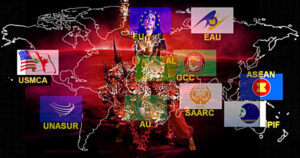 ‘Ten Kings’ of Daniel, Revelation?
‘Ten Kings’ of Daniel, Revelation?
THOUGH FINAL ALIGNMENT, BIBLE CORRELATIONS ARE UNCERTAIN, WORLD’S TEN GEOPOLITICAL REGIONS CLEARLY ARE TODAY’S REALITY
By Tim Porter, Circumspect News, March 15, 2012
In the 1960s, a predominant view among Bible expositors was that when the European Common Market reached a total of ten Western European nations, the time would be right for the fulfillment of the Bible’s prophecies concerning the “ten kings.”
Now, roughly fifty years later, the European Union has grown to 27 member nations, and those Bible teachers’ inadvertent lesson is clear: When it comes to interpreting current events with Bible prophecy, one must take care not to be too dogmatic.
That ’60s interpretation taught another lesson as well — that of misdirection and distraction, for while many have been focusing on developments in Europe, a larger, global scenario has now emerged. It is a scenario that appears more consistent with the biblical narrative of a transformed beast that “shall devour the whole earth” than does one that is just limited to reviving its former Roman Empire perimeter. It is a scenario that sees Europe not as being comprised of “ten kingdoms,” but sees Europe itself as being one of the ten, albeit the most prominent among them.
Indeed, the current global/regional network is undoubtedly Eurocentric, and is being developed through European old-money sources. The European Union is the extolled prototype and the consensus model by which all other geopolitical regions in the world are being developed and measured. The International Monetary Fund and World Bank, institutions that have underwritten regional development throughout the world, are both of European “stock,” with the IMF directed by the Europeans and the World Bank by Europe’s offspring in America.
The global promoter of “regionalization,” the United Nations, is funded disproportionately by its cash cow, the United States, and billions of U.S. foreign aid dollars have also been granted to regions for this agenda. Historically, global colonization and hegemony — even the naming and mapping of many of the world’s modern nations and borders — have originated from two sources — Europe and the United States.
Of course, China has become another major contributor to the cause of regionalization, but China’s rise was enabled by Western investment. Despite its perceived rivalry with the U.S., China has also become the West’s banker, and finds itself in a manufactured interdependence with Western consumers, as well as with Western corporations investing, operating and manufacturing in China. But it is the European Union itself that has become China’s “too big to fail” project, even as China slowly backs away from the U.S. dollar (in large part because the dollar is a national currency, while the euro is regional). A Chinese official has even said that saving the euro is akin to saving globalization, but no such statement has come forth concerning the dollar.
Therefore, it is safe to say that Europe is ground zero for the world’s 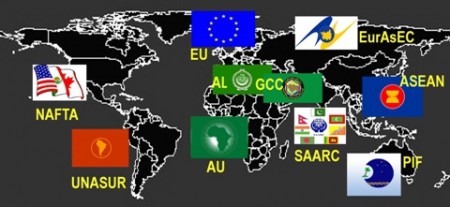 current regionalization movement. Surely, Europa is riding this beast.
current regionalization movement. Surely, Europa is riding this beast.
Whether or not the present regional structure reflects the exact, final alignment for the Bible’s “ten kings” does not diminish the reality of what we see developing today. The following is a list of the world’s ten major geopolitical regions, with their names and acronyms, as they currently exist. Keep in mind that the member-nation makeup of each region is a bit fluid, reflective of populations’ and/or their rulers’ personality conflicts, historical prejudices, etc., as they relate to ongoing integration efforts. The ten major regions are:
- African Union – AU: The AU has five sub-regions in varying stages of integration, after which they plan a continental union.
- Arab League – AL: Also known as the League of Arab States, it is beginning to assert itself against one of its founding members, Syria.
- Association of Southeast Asian Nations – ASEAN: The ten-nation regions is scheduled to build an integrated economic community by 2015, modeled on the European Union.
- Eurasian Economic Community – EurAsEC: Soon to be the Eurasian Economic Union, or Eurasian Union, consisting of former Soviet republics. Russian Prime Minister Vladimir Putin is leading the call for a common currency in the region.
- European Union – EU: The financial crisis created by banksters and their derelict politicians has actually increased the EU technocrats‘ central authority.
- Gulf Cooperation Council – GCC: Soon to become the Gulf Union, comprised of six Arabian Peninsula nations led by Saudi Arabia on the western side of the Persian Gulf, opposite Iran. A common regional currency is planned.
North American Free Trade Association – NAFTA: The recent “Beyond the Border” agreement between the U.S. and Canada establishes a “security perimeter” around the two countries while authorizing the sharing of intelligence with “harmonized” border-crossing procedures for customs, commerce, law enforcement, and even military. - Pacific Islands Forum – PIF: This underdeveloped region encompasses Australia, New Zealand and their Pacific Islands neighbors. It is uncertain whether it will remain a viable region or be dissolved into one or more of the other regions, although those two nations have talked of currency union. The 1973 Club of Rome proposal for a ten-region structure had this region also containing South Africa, a fellow Commonwealth member along with most of the PIF member nations, but since the fall of apartheid South Africa has become more engaged with the African Union.
- South Asian Association for Regional Cooperation – SAARC: Despite historical enmities and mistrust among member nations, SAARC is determined to become the South Asian Union. China has discussed economic integration possibilities with both SAARC and ASEAN.
- Union of South American Nations – UNASUR: The region is using a “circle the wagons” approach, seizing upon member nations’ historic resentment against U.S. and European hegemony and colonialism, as exhibited recently in UNASUR’s united stand in a revival of the Falkland Islands dispute with Britain. In 2008, Brazilian President Luiz Inacio Lula da Silva predicted a common currency for the region.
China certainly is powerful enough to encompass its own region, and it remains to be seen whether its wary ASEAN neighbors will actually enter into an “ASEAN+3″ regional agreement with China, Japan, and Korea. Historical prejudices may drive those three in separate directions, but, as Germany and France since World War II, and as we are beginning to see with SAARC nations India and Pakistan, historical prejudices may wane as new generations react to crises resulting from forced regional economic competition, “global terrorism” and other regional security concerns.
Round Table Groups and the British Commonwealth
Although rulers throughout the ages have dreamed of a global empire, the quest for a global federation did not begin in earnest until Victorian Britain’s Round Table Groups proposed a Commonwealth of Nations. Today the Commonwealth is known merely as a forum of nations formerly administered by the British Empire, but originally it was meant to be something far greater, as it started the drive toward today’s regional framework.
Bill Clinton Pays homage to Carroll Quigley – 1992 Democratic National Convention
Carroll Quigley, Rhodes Scholar/President Bill Clinton’s globalist mentor as a noted history professor at Washington’s Georgetown University when Clinton was a student there, detailed the development and objectives of the Round Table Groups as part of his voluminous, macro-historical text published in 1966, Tragedy and Hope, as follows:
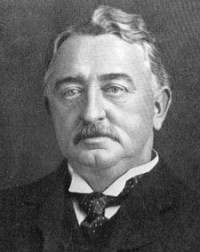 Cecil Rhodes….(1853-1902) fervishly exploited the diamond and goldfields ofSouth Africa….With finincial support from Lord Rothschild and Alfred Beit, he was able to monoplize the diamond mines of South Africa as De Beers Consolidated Mines….In the middle 1890s Rhodes had a personal income… which was spent so freely for his mysterious purposes…. These purposes centered on his desire to federate the English-speaking peoples and to bring all the habitable portions of the world under their control. For this purpose Rhodes left part of his great fortune to found the Rhodes Scholarships at Oxford in order to spread the English ruling class tradition throughout the English-speaking world….Rhodes and [William T.] Stead organized a secret society of which…. Arthur(Lord)Balfour, Lord Rothschild…and others were listed as potential members of a “Circle of Initiates”; while there was to be an outer circle known as the “Associatian of Helpers” (later organized by [John] Milner as the Round Table organization)…. In 1909-1913 they organized semisecret groups, known as Round Table Groups….In 1919 they founded the Royal Institute of International Affairs (Chatham House)….Similar Institutes of International Affairs were established in the chief British dominions and in the United States (where it is known as the Cecil Rhodes Council on Foreign Relations)…. Tragedy and Hope, pp 130-132
Cecil Rhodes….(1853-1902) fervishly exploited the diamond and goldfields ofSouth Africa….With finincial support from Lord Rothschild and Alfred Beit, he was able to monoplize the diamond mines of South Africa as De Beers Consolidated Mines….In the middle 1890s Rhodes had a personal income… which was spent so freely for his mysterious purposes…. These purposes centered on his desire to federate the English-speaking peoples and to bring all the habitable portions of the world under their control. For this purpose Rhodes left part of his great fortune to found the Rhodes Scholarships at Oxford in order to spread the English ruling class tradition throughout the English-speaking world….Rhodes and [William T.] Stead organized a secret society of which…. Arthur(Lord)Balfour, Lord Rothschild…and others were listed as potential members of a “Circle of Initiates”; while there was to be an outer circle known as the “Associatian of Helpers” (later organized by [John] Milner as the Round Table organization)…. In 1909-1913 they organized semisecret groups, known as Round Table Groups….In 1919 they founded the Royal Institute of International Affairs (Chatham House)….Similar Institutes of International Affairs were established in the chief British dominions and in the United States (where it is known as the Cecil Rhodes Council on Foreign Relations)…. Tragedy and Hope, pp 130-132
Carroll Quigley’s research as a historian at Georgetown and Harvard, and his enthusiasm for the globalist cause, gained the confidence of sources within this movement in the United States. These sources allowed Quigley access to the historical records that were cited in Tragedy and Hope. Quigley’s book was not meant to be an exposé of the nefarious activities of the Council on Foreign Relations (CFR) or its part in the semisecret “Anglophile network,” but as a record for posterity of what he believed to be their grand effort, as he explained:
I know of the operation of this network because I have studied it for twenty years and was permitted for two years, in the early 1960’s, to examine its papers and secret records. I have no aversion to it or to most of its aims and have, for much of my life, been close to it and to many of its instruments. I have objected, both in the past and recently, to a few of its policies… but in general my chief difference of opinion is that it wishes to remain unknown, and I believe its role in history is significant enough to be known. Tragedy and Hope, p 950
Quigley alluded to an “American Union” as being one of the goals of the early 20th Century Round Table Groups in their pursuit of a global federation:
From 1884 to about 1915, the members of this group worked valiantly to extend the British Empire and to organize it in a federal system….They also hoped to bring the United States into this organization to whatever degree was possible. Stead was able to get Rhodes to accept, in principle, a solution which might have made Washington the capital of the whole organization or allow parts of the empire to become states of the American Union…. Tragedy and Hope, p 133
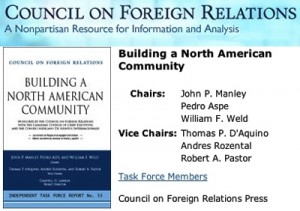 It is not surprising therefore that today’s call for a “North American Community,” being advanced by executive fiat with the U.S.-Canada “Beyond the Border” agreement and its “North American security perimeter,” is being promoted chiefly by the Council on Foreign Relations and its representatives.
It is not surprising therefore that today’s call for a “North American Community,” being advanced by executive fiat with the U.S.-Canada “Beyond the Border” agreement and its “North American security perimeter,” is being promoted chiefly by the Council on Foreign Relations and its representatives.
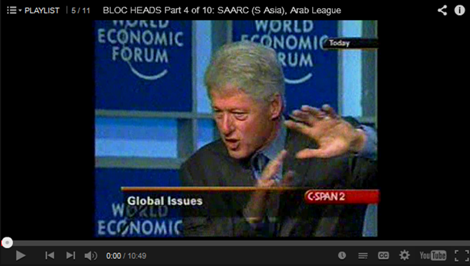 Neither is it surprising that “Rhodes Scholar” Bill Clinton would be groomed by that globalist institution to promote the “pushing” of the world’s independent nations into an economic/political network of “interdependence” and “integration” through “systematic [i.e., methodical, regulatory] change.” As fellow globalist and CFR spokesman Richard Gardner wrote in the CFR journal Foreign Affairs in April 1974, entitled, “The Hard Road to World Order,” the globalist network would have to make “an end run around national sovereignty, eroding it piece by piece…”
Neither is it surprising that “Rhodes Scholar” Bill Clinton would be groomed by that globalist institution to promote the “pushing” of the world’s independent nations into an economic/political network of “interdependence” and “integration” through “systematic [i.e., methodical, regulatory] change.” As fellow globalist and CFR spokesman Richard Gardner wrote in the CFR journal Foreign Affairs in April 1974, entitled, “The Hard Road to World Order,” the globalist network would have to make “an end run around national sovereignty, eroding it piece by piece…”
VIDEO: Bill Clinton – PUSH World Integration – Davos 1-21-04 ‘Build the Kingdom‘
Clinton’s audacious ego is certainly consistent with the Rhodes/Round Table tradition. The extent to which the Round Table moguls were full of themselves was revealed in their audacity to believe that their English ruling class had assumed divine authority to rule a global federation. Their disdain for other races’ capacity to govern themselves was evidenced by Round Tabler Lionel Curtis, as quoted in Tragedy and Hope:
“Personally I regard this challenge to the long unquestioned claim of the white man to dominate the world as inevitable and wholesome, especially to ourselves….The world is in the throes which precede creation or death. Our whole race has outgrown the merely national state and, as surely as the day folows night or night the day, will pass either to a Commonwealth of Nations or else to an empire of slaves. And the issue of these agonies rests with us.” Tragedy and Hope, p 147
As they convened in their parlors, the Round Table Groups reached delusional consensus that dealt to themselves a divine mandate, providing the means to govern all nations, and thereby, ‘the Kingdom of God could be established on earth”:
The creation of the Round Table Groups…was so secretive that, even today, many close students of the subject are not aware of its significance. These men had formed their intellectual growth at Oxford…on Edmund Burke’s On Conciliation with America, and on The New Testament’s “Sermon on the Mount.” The last was especially influential on Lionel Curtis. He had a fanatical conviction that with the proper spirit and the proper organization (local self-government and federalism), the Kingdom of God could be established on earth….
When Lord Lothian died in Washington in 1940, Curtis published a volume of his speeches and included the obituary which Grigg had written for The Round Table. Of Lothian this said, “He held that men should strive to build the kingdom of Heaven here upon this earth, and that the leadership in that task must fall first and foremost upon the English-speaking peoples…. Tragedy and Hope, pp 146-147
“Intellectual growth” notwithstanding, the Machiavellian means by which this aristocratic network would attempt to achieve its goal could not be said to be consistent with the “Sermon on the Mount”:
There does exist, and has existed for a generation [before the ’60s], an international Anglophile network which operates, to some extent, in the way the Radical right believes the Communists act. In fact, this network, which we may identify as the Round Table Groups, has no aversion to cooperating with the Communists, or any other group, and frequently does so. Tragedy and Hope, p 950
David Rockefeller, CFR Honorary Chairman and once-longtime chairman of Chase Manhattan Bank, has confirmed this Round Table sentiment many times. Rockefeller has gushed praise upon the “efficient” administration of Mao’s communist China (that slaughtered an estimated 40 million Chinese) and other authoritarian regimes as being a strong point for investment. The authoritarian, elitist nature of the Round Table network is further evidenced by the fact that Cecil Rhodes’ role model throughout his life was a man named John Ruskin, as Quigley noted:
 Until 1870 there was no professorship of fine arts at Oxford, but in that year, thanks to the Slade bequest, John Ruskin was named to such a chair. He hit Oxford like an earthquake…. Ruskin spoke to the Oxford undergraduates as members of the privileged, ruling class. He told them that they were the possessors of a magnificent tradition of education, beauty, rule of law, freedom,decency, and self-discipline but that this tradition could not be saved, and did not deserve to be saved, unless it could be extended to the lower classes in England itself and to the non-English masses throughout the world. If this precious tradition were not extended tothese two great majorities, the minority of upper-class Englishmen would ultimately be submerged by these majorities and the tradition lost. To prevent this, the tradition must be extended to the masses and to the empire. Ruskin’s message had a sensational impact. His inaugural lecture was copied out in long hand by one undergraduate, Cecil Rhodes, who kept it with him for thirty years. Tragedy and Hope, p 130 John Ruskin
Until 1870 there was no professorship of fine arts at Oxford, but in that year, thanks to the Slade bequest, John Ruskin was named to such a chair. He hit Oxford like an earthquake…. Ruskin spoke to the Oxford undergraduates as members of the privileged, ruling class. He told them that they were the possessors of a magnificent tradition of education, beauty, rule of law, freedom,decency, and self-discipline but that this tradition could not be saved, and did not deserve to be saved, unless it could be extended to the lower classes in England itself and to the non-English masses throughout the world. If this precious tradition were not extended tothese two great majorities, the minority of upper-class Englishmen would ultimately be submerged by these majorities and the tradition lost. To prevent this, the tradition must be extended to the masses and to the empire. Ruskin’s message had a sensational impact. His inaugural lecture was copied out in long hand by one undergraduate, Cecil Rhodes, who kept it with him for thirty years. Tragedy and Hope, p 130 John Ruskin
Ruskin was a prominent socialist of his time who since has been widely interpreted by the academic aristocracy as a man with compassion for the poor, downtrodden masses, and for wanting to improve their lives by remaking society. However, the core of his belief was elitist to the point of advocating authoritarian subjection of those he perceived to be inferior – for their own good of course – as he himself summed up in his compilation of papers published in 1860, Unto This Last:
.. if there be any one point insisted on throughout my works more frequently than another, that one point is the impossibility of Equality. My continual aim has been to show the eternal superiority of some men to others, sometimes even of one man to all others; and to show also the advisability of appointing such persons or person to guide, to lead, or on occasion even to compel and subdue, their inferiors according to their own better knowledge and wiser will. My principles of Political Economy were all involved in a single phrase spoken three years ago at Manchester: “Soldiers of the Ploughshare as well as Soldiers of the Sword”: and they were all summed in a single sentence in the last volume of Modern Painters–“Government and co-operation are in all things the Laws of Life; Anarchy and competition the Laws of Death. Unto This Last, John Ruskin
It is no wonder that Ruskin’s authoritarian, anti-competition teachings were embraced by the monopolist Rhodes and his group, as well as by the eugenics movement in England, the rise of which paralleled and intertwined with the Round Table movement within the British aristocracy.
Eugenics, a proactive social Darwinism, enforced and accelerated Darwin’s “survival of the fittest” (Darwin also was a Victorian elitist), and took Ruskin’s authoritarian improvement of humanity into the dangerous realm of the biological. Today it has been developed into transhumanism – the effort to fuse man and technology.
VIDEO: EndGame – History of Eugenics
The most disconcerting aspect to all of this was the elitists’ audacity to assume godhood and impose their “English ruling class tradition” throughout the world. Indeed, the religious element of this “perfectibility of man” was also in vogue in Victorian England during the late 1800s, particularly with the presence of Occult practices in high society, paying homage to the serpent’s perceived “enlightenment” that “ye shall be as gods…” Not surprisingly, Ruskin himself was a key figure in this development.
Ruskin was a member of the Society of Psychical Research, as were Alfred Lord Tennyson, Arthur Balfour (Prime Minister 1902-1905), and William Gladstone (Prime Minister 1865-74). The SPR attracted many within British intellectual circles who had an interest in investigating the scientific credibility of paranormal activities.
As an educator, Ruskin was noted for his emphasis in romanticism and gothic artistry. It was in this monistic, pantheistic nexus with naturalism – and the SPR’s attempt to rationalize the spirit world – that Ruskin dwelled.
Since art symbolism was of great importance to Ruskin, there is perhaps no better summation of Ruskin’s life than the symbolism on his gravestone. Among the various esoteric symbols, the most striking is the swastika separating his birth and death years. 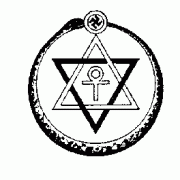
Before Hitler made the swastika an obvious symbol of evil, it had been used 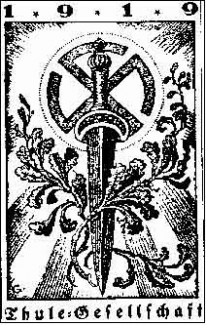 for ages as a sun symbol in the occult and eastern religions. It also symbolized good fortune, but, like the yin-yang, the occult believed its force could also be utilized by the “dark side.” Indeed it was, during that same late-1800s time period by such groups as Helena Petrovna Blavatsky’s Theosophical Society.
for ages as a sun symbol in the occult and eastern religions. It also symbolized good fortune, but, like the yin-yang, the occult believed its force could also be utilized by the “dark side.” Indeed it was, during that same late-1800s time period by such groups as Helena Petrovna Blavatsky’s Theosophical Society.
Theosophical Society Symbol
The Theosophical Society was openly Luciferian, and used the swastika in many of its publications. Like all occult philosophies – both “white” and “dark,” – theosophists promoted the idea of the ascendency of man toward godhood through various rituals. For theosophists, these included gnostic sacrifice and eugenics to achieve their ideal superman.
Hitler, the consummate eugenicist, and his inner circle were deeply into the occult. Hitler himself had been a member of the Thule Society, and took its swastika symbol for his own. It is reported that he kept a copy of Blavatsky’s writings at his bedside. He would give credit to American eugenicists, particularly Thule Society Symbol, 1919 The Passing of the Great Race author Madison Grant, for being instrumental in his quest to develop the “pure Aryan.”
VIDEO: BLOC HEADS – Hitler “channels” swastika “power” to troops. In the 1930s, an influential segment of high society in both Britain and America actually admired and supported Hitler’s National-Socialist transformation of Germany. Their perception of Hitler before the war paralleled the favor among occultists for the pre-Hitler swastika, as a beneficial symbol for those who would utilize its power.
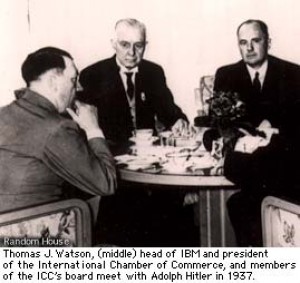 One of those admirers of Hitler in America was Thomas J. Watson, founder of International Business Machines (IBM). Watson was an advocate of eugenics and population control, not unlike modern “philanthropists” Bill Gates and Warren Buffett, who have supported China’s brutal “one child” policy and other population control measures throughout the world.
One of those admirers of Hitler in America was Thomas J. Watson, founder of International Business Machines (IBM). Watson was an advocate of eugenics and population control, not unlike modern “philanthropists” Bill Gates and Warren Buffett, who have supported China’s brutal “one child” policy and other population control measures throughout the world.
Watson met with Hitler in 1937, and actually provided Hitler with the primitive computers that allowed the Nazis to number and account for each person in the Jewish population. The numbers on the arms of Jewish holocaust victims were IBM computer numbers. That notorious chapter in IBM’s history is not well known, but IBM is not ashamed of its founder. The famous computer that recently competed on the game show “Jeopardy!” was an IBM model named “Watson.” Today, IBM is still one of the leading voices and providers of technology for a global identity management solution.
Others in the American and British establishment elite were not left out of the eugenics/Hitler love fest. Joining Watson in his meeting with Hitler were the president and board members of the International Chamber of Commerce, an organization that today is a leading advocate of the “multilateral trade” framework that has been the basis for regionalization. W. Averell Harriman’s Union Banking Corporation, and partner/director George Herbert Walker’s son-in-law, Prescott Bush (father/grandfather of two presidents), were cited in 1942 under the Trading with the Enemy Act, and the corporation’s assets and shares were seized for acting as phantom holders of German industrialist and Hitler financier Fritz Thyssen’s American assets. The Rockefellers, Carnegies, and Harrimans, financiers of early-20th Century eugenics programs in America, Britain and Germany, were also prominent in the Round Table/CFR movement and were supporters of initiating the Federal Reserve central banking system in the U.S.
In Britain, King Edward’s 1936 abdication and virtual lifetime exile was not due merely to his marriage to Wallis Simpson, but to his widely known fondness for Hitler’s fascism. Edward’s sentiment was not necessarily an anomaly in British royalty, however. Prince Philip, Duke of Edinburgh and husband of Queen Elizabeth (Head of the Commonwealth of Nations), has some Nazi-eugenics skeletons in his closet as well. All four of his sisters married German officers, including one that married an SS colonel who named his eldest son Karl Adolf, after Hitler.
This intermingling of British and German aristocracy should not be surprising when it is considered that the modern British royal dynasty began in 1840, when Queen Victoria married her first cousin, Prince Albert, Duke of Saxe-Coburg in Germany. Her grandson, King George V, had been designated an honorary German field marshal before World War I, but shed the title entering the war and began using the Windsor name.
 Granted, having family ties to German aristocracy does not make one a Hitler supporter, but Prince Philip’s views on population control and the culling of excess humans are no less chilling and demented than a Nazi rally. In his foreword to the book, If I Were an Animal by Fleur Cowles, Prince Philip wrote:
Granted, having family ties to German aristocracy does not make one a Hitler supporter, but Prince Philip’s views on population control and the culling of excess humans are no less chilling and demented than a Nazi rally. In his foreword to the book, If I Were an Animal by Fleur Cowles, Prince Philip wrote:
I just wonder what it would be like to be reincarnated in an animal whose species had been so reduced in numbers that it was in danger of extinction. What would be its feelings toward the human species whose population explosion had denied it somewhere to exist….I must confess that I am tempted to ask for reincarnation as a particularly deadly virus.
In light of his family’s sordid elitist history, it is no wonder that Prince Philip’s grandson, young Prince Harry, had no qualms about dressing as a Nazi for a costume party in January, 2005.
Why Ten?
Such is the mindset and character of the present movement to integrate the entire planet into a monopolist, fascist, population-controlled, occult “New World Order” of regions. Lying beneath the surface of human existence for ages, this agenda has proliferated within the past century into a blatant arrogance against any who would question the movement’s god-like authority to pursue its version of “the perfectibility of man.”
And it raises an important question: Why ten? Why, after all these centuries since the “ten kings” prophecies were put down in Scripture, would not random chance today allow any other number of major geopolitical regions to span the globe?
More to the point: Despite their open disdain for what they consider the “myths” of the Bible, why is there such a blatant drive by its leaders to associate this movement with the great rebellion against the God of the Bible, as the adjacent illustrations indicate? (The first, from the Council of Europe, resembles Bruegel’s Tower of Babel painting to depict the continent’s drive toward integration as a modern rebuilding of that tower under an EU circle of pentagrams, while the second is a picture of the completed European Parliament Building displaying the same theme.)
Wouldn’t normal people go out of their way to distance themselves from anything 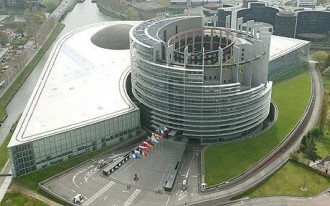 perceived as so authoritarian and nefarious? The answer is obvious: These are not normal people. What’s worse, they don’t consider themselves normal – they are the “elite.” Domination has been their business; they believe it is their divine right – and destiny.
perceived as so authoritarian and nefarious? The answer is obvious: These are not normal people. What’s worse, they don’t consider themselves normal – they are the “elite.” Domination has been their business; they believe it is their divine right – and destiny.
That consideration brings us back to the original question, presented in the title of this article: Is the world’s emerging New World Order of regions being built to accommodate the appearance of the “ten kings” of Daniel and Revelation in the Bible?
In the Revelation of Jesus Christ, the Apostle John wrote, “Blessed is he that readeth, and 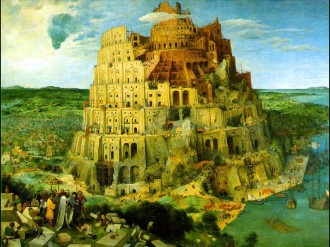 they that hear the words of this prophecy, and keep those things which are written therein: for the time is at hand.” John and the prophet Daniel wrote much of their Scripture text about the actions of governments, and much of the entire Bible concerns narratives and lessons about governments’ interaction with humanity under the authority of God.
they that hear the words of this prophecy, and keep those things which are written therein: for the time is at hand.” John and the prophet Daniel wrote much of their Scripture text about the actions of governments, and much of the entire Bible concerns narratives and lessons about governments’ interaction with humanity under the authority of God.
Why then do so many American Christians believe it is somehow not their spiritual responsibility to become aware of – and to reprove – the present “end run around national sovereignty,” that openly displays all the characteristics of the great rebellion against their God, and the Lord Jesus Christ? Tower of Babel – Bruegel, 1563
 And the whole earth was of one language, and of one speech. Genesis 11:1
And the whole earth was of one language, and of one speech. Genesis 11:1
For more information, see Antony C. Sutton’s Wall Street and the Rise of Hitler and Wall Street and the Bolshevik Revolution.

